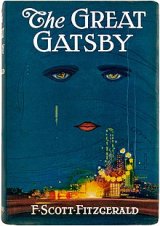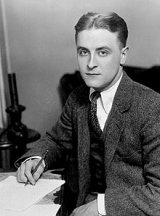The Great Gatsby Page #13
The Great Gatsby is a 1925 novel by American writer F. Scott Fitzgerald. Set in the Jazz Age on Long Island, near New York City, the novel depicts first-person narrator Nick Carraway's interactions with mysterious millionaire Jay Gatsby and Gatsby's obsession to reunite with his former lover, Daisy Buchanan. The novel was inspired by a youthful romance Fitzgerald had with socialite Ginevra King, and the riotous parties he attended on Long Island's North Shore in 1922
impression that the events of three nights several weeks apart were all that absorbed me. On the contrary, they were merely casual events in a crowded summer, and, until much later, they absorbed me infinitely less than my personal affairs. Most of the time I worked. In the early morning the sun threw my shadow westward as I hurried down the white chasms of lower New York to the Probity Trust. I knew the other clerks and young bond-salesmen by their first names, and lunched with them in dark, crowded restaurants on little pig sausages and mashed potatoes and coffee. I even had a short affair with a girl who lived in Jersey City and worked in the accounting department, but her brother began throwing mean looks in my direction, so when she went on her vacation in July I let it blow quietly away. I took dinner usually at the Yale Club—for some reason it was the gloomiest event of my day—and then I went upstairs to the library and studied investments and securities for a conscientious hour. There were generally a few rioters around, but they never came into the library, so it was a good place to work. After that, if the night was mellow, I strolled down Madison Avenue past the old Murray Hill Hotel, and over 33rd Street to the Pennsylvania Station. I began to like New York, the racy, adventurous feel of it at night, and the satisfaction that the constant flicker of men and women and machines gives to the restless eye. I liked to walk up Fifth Avenue and pick out romantic women from the crowd and imagine that in a few minutes I was going to enter into their lives, and no one would ever know or disapprove. Sometimes, in my mind, I followed them to their apartments on the corners of hidden streets, and they turned and smiled back at me before they faded through a door into warm darkness. At the enchanted metropolitan twilight I felt a haunting loneliness sometimes, and felt it in others—poor young clerks who loitered in front of windows waiting until it was time for a solitary restaurant dinner—young clerks in the dusk, wasting the most poignant moments of night and life. Again at eight o’clock, when the dark lanes of the Forties were lined five deep with throbbing taxicabs, bound for the theatre district, I felt a sinking in my heart. Forms leaned together in the taxis as they waited, and voices sang, and there was laughter from unheard jokes, and lighted cigarettes made unintelligible circles inside. Imagining that I, too, was hurrying towards gaiety and sharing their intimate excitement, I wished them well. For a while I lost sight of Jordan Baker, and then in midsummer I found her again. At first I was flattered to go places with her, because she was a golf champion, and everyone knew her name. Then it was something more. I wasn’t actually in love, but I felt a sort of tender curiosity. The bored haughty face that she turned to the world concealed something—most affectations conceal something eventually, even though they don’t in the beginning—and one day I found what it was. When we were on a house-party together up in Warwick, she left a borrowed car out in the rain with the top down, and then lied about it—and suddenly I remembered the story about her that had eluded me that night at Daisy’s. At her first big golf tournament there was a row that nearly reached the newspapers—a suggestion that she had moved her ball from a bad lie in the semifinal round. The thing approached the proportions of a scandal—then died away. A caddy retracted his statement, and the only other witness admitted that he might have been mistaken. The incident and the name had remained together in my mind. Jordan Baker instinctively avoided clever, shrewd men, and now I saw that this was because she felt safer on a plane where any divergence from a code would be thought impossible. She was incurably dishonest. She wasn’t able to endure being at a disadvantage and, given this unwillingness, I suppose she had begun dealing in subterfuges when she was very young in order to keep that cool, insolent smile turned to the world and yet satisfy the demands of her hard, jaunty body. It made no difference to me. Dishonesty in a woman is a thing you never blame deeply—I was casually sorry, and then I forgot. It was on that same house-party that we had a curious conversation about driving a car. It started because she passed so close to some workmen that our fender flicked a button on one man’s coat. “You’re a rotten driver,” I protested. “Either you ought to be more careful, or you oughtn’t to drive at all.” “I am careful.” “No, you’re not.” “Well, other people are,” she said lightly. “What’s that got to do with it?” “They’ll keep out of my way,” she insisted. “It takes two to make an accident.” “Suppose you met somebody just as careless as yourself.” “I hope I never will,” she answered. “I hate careless people. That’s why I like you.” Her grey, sun-strained eyes stared straight ahead, but she had deliberately shifted our relations, and for a moment I thought I loved her. But I am slow-thinking and full of interior rules that act as brakes on my desires, and I knew that first I had to get myself definitely out of that tangle back home. I’d been writing letters once a week and signing them: “Love, Nick,” and all I could think of was how, when that certain girl played tennis, a faint moustache of perspiration appeared on her upper lip. Nevertheless there was a vague understanding that had to be tactfully broken off before I was free. Everyone suspects himself of at least one of the cardinal virtues, and this is mine: I am one of the few honest people that I have ever known. IV On Sunday morning while church bells rang in the villages alongshore, the world and its mistress returned to Gatsby’s house and twinkled hilariously on his lawn. “He’s a bootlegger,” said the young ladies, moving somewhere between his cocktails and his flowers. “One time he killed a man who had found out that he was nephew to Von Hindenburg and second cousin to the devil. Reach me a rose, honey, and pour me a last drop into that there crystal glass.” Once I wrote down on the empty spaces of a timetable the names of those who came to Gatsby’s house that summer. It is an old timetable now, disintegrating at its folds, and headed “This schedule in effect July 5th, 1922.” But I can still read the grey names, and they will give you a better impression than my generalities of those who accepted Gatsby’s hospitality and paid him the subtle tribute of knowing nothing whatever about him. From East Egg, then, came the Chester Beckers and the Leeches, and a man named Bunsen, whom I knew at Yale, and Doctor Webster Civet, who was drowned last summer up in Maine. And the Hornbeams and the Willie Voltaires, and a whole clan named Blackbuck, who always gathered in a corner and flipped up their noses like goats at whosoever came near. And the Ismays and the Chrysties (or rather Hubert Auerbach and
Translation
Translate and read this book in other languages:
Select another language:
- - Select -
- 简体中文 (Chinese - Simplified)
- 繁體中文 (Chinese - Traditional)
- Español (Spanish)
- Esperanto (Esperanto)
- 日本語 (Japanese)
- Português (Portuguese)
- Deutsch (German)
- العربية (Arabic)
- Français (French)
- Русский (Russian)
- ಕನ್ನಡ (Kannada)
- 한국어 (Korean)
- עברית (Hebrew)
- Gaeilge (Irish)
- Українська (Ukrainian)
- اردو (Urdu)
- Magyar (Hungarian)
- मानक हिन्दी (Hindi)
- Indonesia (Indonesian)
- Italiano (Italian)
- தமிழ் (Tamil)
- Türkçe (Turkish)
- తెలుగు (Telugu)
- ภาษาไทย (Thai)
- Tiếng Việt (Vietnamese)
- Čeština (Czech)
- Polski (Polish)
- Bahasa Indonesia (Indonesian)
- Românește (Romanian)
- Nederlands (Dutch)
- Ελληνικά (Greek)
- Latinum (Latin)
- Svenska (Swedish)
- Dansk (Danish)
- Suomi (Finnish)
- فارسی (Persian)
- ייִדיש (Yiddish)
- հայերեն (Armenian)
- Norsk (Norwegian)
- English (English)
Citation
Use the citation below to add this book to your bibliography:
Style:MLAChicagoAPA
"The Great Gatsby Books." Literature.com. STANDS4 LLC, 2025. Web. 24 Feb. 2025. <https://www.literature.com/book/the_great_gatsby_1598>.








Discuss this The Great Gatsby book with the community:
Report Comment
We're doing our best to make sure our content is useful, accurate and safe.
If by any chance you spot an inappropriate comment while navigating through our website please use this form to let us know, and we'll take care of it shortly.
Attachment
You need to be logged in to favorite.
Log In